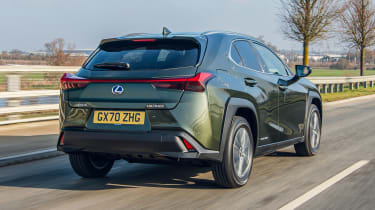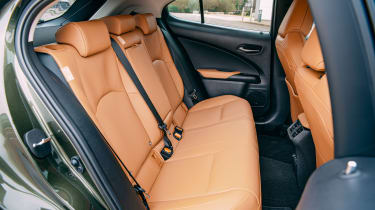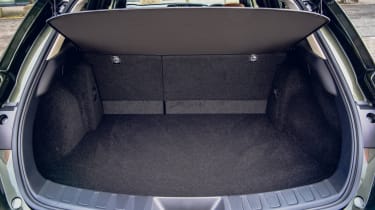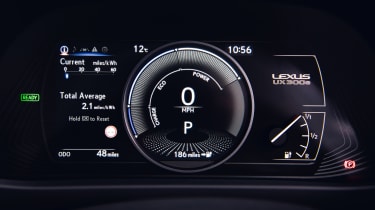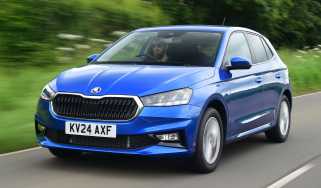Lexus UX 300e SUV review
"The Lexus UX 300e is a refined electric SUV with a respectable range”
Pros
- Refined
- Cheap to run
- Build quality
Cons
- Small for an SUV
- Expensive top trims
- Infotainment touchpad
The Lexus UX 300e is the Japanese brand’s first all-electric car. It’s somewhat surprising it’s taken so long, given that Lexus and parent company Toyota have been a pioneering force in building electrified hybrid cars like the Toyota Prius and Lexus CT.
Sitting on the same basic platform as the Toyota Corolla and C-HR, the late arrival will go head-to-head against a growing number of models such as the Hyundai Kona Electric, Mazda MX-30 and Peugeot e-2008. Starting from just over £40,000, it also undercuts the Volvo XC40 Recharge P8, which is another premium electric SUV.
 Top 10 best electric SUVs – the ones to buy in 2025
Top 10 best electric SUVs – the ones to buy in 2025
With a 53.4kWh battery pack, the UX 300e boasts a range of 196 miles and supports rapid charging at 50kW. It can be topped up from 0-80% in around 50 minutes and charged at home overnight, in just over eight hours. Those are fairly competitive figures, giving the UX 300e a range that matches the Peugeot and easily betters the MX-30.
Its quiet electric motor also accentuates the refinement we've come to associate with Lexus cars, while giving the UX an impressive turn of speed. It has 201bhp, front-wheel drive and a single forward gear, so 0-62mph in 7.5 seconds arrives with an effortless surge. You aren't quite pinned back in the seat, but it feels plenty fast enough for a crossover, particularly around town.
More reviews
With few changes from the standard car, the interior features plenty of quality materials and a sturdiness evidenced by a lack of any rattles or unwanted vibrations. The touchpad-controlled infotainment screen takes some getting used to, but it at least now comes with Apple CarPlay and Android Auto.
The UX is one of the smaller models in its class but four occupants will still be comfortable thanks to its plush seats. Surprisingly, the UX 300e also has more boot space than the Hybrid version, with 367 litres versus 320 litres. However, that's still less space than a Volkswagen ID.3 or Nissan Leaf, so the SUV badge here is more about style than space.
It might be the brand’s first attempt at an electric car but the Lexus UX 300e gets a lot of things right. It's smooth, good to drive and pleasant to sit in. The range-topping Takumi model is expensive but entry versions still offer a reasonable amount of kit and are better value.
Range, charging & running costs
Lexus has jumped straight into the EV market with a competitively-sized 54.3kWh battery. This gives the UX 300e a 196-mile range with 17-inch alloy wheels fitted - an easy victory over the underwhelming 124 miles you get from the Mazda MX-30. The Volvo XC40 Recharge P8 has a larger 75kWh battery and 260-mile range, but it's also much more expensive. Our test car predicted a range of 165 miles from a full charge, which seemed accurate after a drive.
If you need to take a longer trip, it can also be topped up pretty quickly. Lexus has included 50kW rapid charging for use at compatible public charging points, taking the car from 10 to 80% in 50 minutes. At home it can charge at a maximum of 6.6kW using a wallbox, taking it from 0 to 100% in around eight hours. AC and DC charging cables are included as standard, and the charging port is found where the fuel filler used to be, at the rear of the car.
Compared with a petrol or diesel powered rival, the UX 300e is expensive to buy outright, but Lexus estimates that owners will save around £3,000 in fuel over four years. Company-car customers will also be drawn to the electric UX by its 0% Benefit-in-Kind (BiK) in 2020/21, which goes up to 1% in the following tax year. Other cost savings include nothing to pay in VED and exemption from schemes like the London Congestion Charge.
Electric motor, drive & performance
Lexus has an impressive reputation for making refined, soothing cars, and an electric powertrain has only helped the UX in this regard. It’s quick as well though, accelerating from 0-62mph in 7.5 seconds thanks to its single 201bhp electric motor. Power is sent to just the front wheels, and it's possible to spin the wheels if you aren't smooth with the accelerator pedal.
Of course, there are no gears to worry about, and the motor's instant torque makes the UX 300e feel even nippier than its figures suggest around town. The steering is accurate, if not full of feel, and it can even wriggle in your hands as power is applied - like a powerful front-wheel drive hot hatch. It has a maximum speed of 100mph but that's not a figure most EV buyers will be interested in. More importantly, most overtaking manoeuvres are a breeze.
There's no getting away from the fact that batteries are heavy, and this relatively small SUV weighs 1,840kg. At least the battery pack is low to the ground, and Lexus has managed to give the UX 300e responsive handling and a planted feel. Despite its weight, body lean is kept under control even along a twisting road. There are also paddles behind the steering wheel to adjust the level of regenerative braking and the retardation you feel when releasing the throttle. However, it doesn't offer one-pedal driving even in its strongest setting.
Interior & comfort
Lexus has topped our owner polls for years, and positive feedback for its interiors has been part of the praise. Refinement is often cited, and the near-silent electric powertrain certainly helps in this regard. There's a solid feel, with no rattles from the dashboard, lots of quality materials and comfortable front seats. The latter can even adjust to quite a low position, which somewhat defeats the object of the SUV body but should please keen drivers.
The dashboard is slightly quirky, with a driver-focused design and narrow widescreen infotainment display besides an analogue clock. Large rotary controls sprout from the top of the instrument binnacle, which helps keep your eyes on the road but aren't the most attractive solution. Entry-level models get a seven-inch infotainment screen, and both this and the upgraded system now have Apple CarPlay and Android Auto. This is good news, because Lexus' standard software isn't the easiest to use - although you still have to navigate with the frustrating touchpad controller when using them.
Even the base version of the UX 300e comes with plenty of kit: front and rear parking sensors, LED headlights, a rear-view front camera and eight-way adjustable seats. Premium Plus pack adds luxuries like leather, heated and ventilated front seats, heated rear seats, a wireless phone charger and keyless entry.
And it doesn't stop there, because Takumi pack models have a bigger 10.3-inch infotainment screen, a 13-speaker Mark Levinson stereo, head-up display, all-round cameras and advanced headlights. It's impressive but pushes the price to well over £50,000, which feels a lot for a crossover.
Practicality & boot space
The Lexus UX isn't a massive SUV, instead it's best thought of as an alternative to something like a Nissan Leaf or Volkswagen ID.3. It has also been quite well designed to accommodate four adults in comfort, despite the lack of outright space. Getting in the back is easier than the MX-30, with its rear-hinged back doors, but the aperture is still small, and it's easy to bang your head while getting in. The extra space taken up by the battery also means there's nowhere to put your feet under the front seats.
Unusually for an EV, its boot is slightly larger than the regular UX. There's 367 litres of space behind the back seats, which is quite a bit more than the Mazda and compares with 385 litres for the ID.3. The Volvo XC40 Recharge P8 is bigger again, with a 452-litre boot.
You can also fold down the back seats to free up more space but unlike the Volvo, there's no 'frunk' storage space under the bonnet - all the space is taken up by the motor. Interior storage space consists of normal doorbins, a central armrest you can open and a few cupholders, so there's nothing too innovative.
Reliability & safety
Lexus topped our Driver Power satisfaction survey in 2020, falling to a still impressive 10th place in 2021. Just 9.7% of owners told us they had experienced a fault within the first year, including minor glitches with items including parking sensors. Overall, reliability and build quality was rated very highly.
The regular Lexus UX has already been subject to Euro NCAP crash testing, and was awarded the full five-star rating. This included an impressive 96% score for adult occupants, as well as 85% for child occupants. Part of the reason for the high score is active safety technology including autonomous emergency braking, road-sign recognition and headlights that automatically switch between dipped and high-beam.
Range-topping Takumi versions get additional safety kit, including advanced LED headlights, blind-spot monitoring, a 360-degree parking view and rear-cross traffic alert that can stop the car if it detects a collision is imminent.
Which Is Best?
Cheapest
- Name300e 150kW 72.8 kWh Urban 5dr E-CVT
- Gearbox typeAuto
- RRP£39,129
Most Economical
- Name300e 150kW 72.8 kWh Premium 5dr E-CVT
- Gearbox typeAuto
- RRP£41,209
Fastest
- Name300e 150kW 72.8 kWh Urban 5dr E-CVT
- Gearbox typeAuto
- RRP£39,129


